How did Pride and Prejudice manage a Golden Globe nomination for Best Picture (Musical/Comedy)? It’s spirited and infectious and “romantic,” okay, but I don’t see how anyone could try to call it a dramedy even. The Broadcast Film Critics Association wants to be the new Golden Globes and elbow the GG’s aside….fine. But to get there the BFCA nominations have can’t just be numerous — they also have to veer into the ridiculous and be joked about around town. And right now, the Globes are way in front.
 Jeffrey Wells
Jeffrey Wells
We all expected that Brokeback
We all expected that Brokeback Mountain, The Constant Gardener and Good Night, and Good Luck would be among the five Golden Globes Best Picture (Drama) nominees. And I guess A History of Violence‘s inclusion isn’t all that surprising. But I’m especially gratified (and welcomely surprised) that Woody Allen’s Match Point is one of the five. This should boost the box-office when it opens on 12.28 and add to the Oscar nomination momentum.
Those two Golden Globe Munich
Those two Golden Globe Munich nominations — Steven Spielberg for Best Director and Tony Kushner (and Eric Roth?) for Best Screenplay — are ceremonial/political gestures meant to compensate for the lack of a Best Picture (Drama) nomination. I think this is really the end of the road for Munich. No critics awards, no Golden Globe noms to speak of…where can it go from here? There is no joy in Mudville this morning. The “presumptive Best Picture winner” made by the Mighty Steven has struck out.
Words for Kevin
Thick as Thieves
Once again reactions to Werner Herzog’s Grizzly Man have people shaking their heads and asking “what the hell?” And once again there’s reason to ask why the members of the Motion Picture Academy’s Documentary Executive Committee continue to hold to a tendency to make total boob-level decisions.
Knowledgable people everywhere were appalled when Herzog’s brilliant examina- tion of the life of Timothy Treadwell, a self-promoting grizzly bear obsessive who wound up getting eaten by one, didn’t make the committee’s short list of doc fin- alists, which was announced on 11.15.05.

The late Timothy Treadwell as presented in Werner Herzog’s Grizzly Man
And now the committee’s oversight is being examined once again in the wake of Grizzly Man having been named the year’s best feature-length documentary by four respected critics groups — the New York Film Critics Circle, the Los Angel- es Film Critics, the New York Online Film Critics and the San Francisco Film Critics — over the last four days.
The doc committee, chaired this year by Freda Mock, of course isn’t obliged to agree with film critics groups in its choice of the year’s finest. But with four different groups of obviously passionate film lovers picking Grizzly Man, wouldn’t you think the AMPAS committee would have at least included it on the preliminary list of finalists?
< ?php include ('/home/hollyw9/public_html/wired'); ?>
Obviously there’s a major disconnect going on here.
I called around about this and all I hear are the usual throwaway comments. A publicist who asked for anonymity said the documentary committee is “a curious bunch.” A nameless documentary filmmaker I spoke to said, “You never know about these people.”
It’s been suggested here and there that Grizzly Man didn’t rate in the committee’s eyes because it’s composed of mostly found video footage — i.e., Treadwell’s — or because Herzog edited the film for a relatively short period of time. Whatever.
I called an Academy spokesperson this afternoon for some sort of explanation or comment about this disparity of opinion. She declined.
Lion’s Gate Home Entertainment will be releasing a DVD of Grizzly Man on DVD on Tuesday, 12.26.
Words for Kevin
I’m not sure if people are getting how reborn Kevin Costner is these days. I don’t know him and I’m not claiming any special insight, but over the last two or three years Costner seems to have remade himself into this quietly self-amused older guy who just ambles along and instinctually gets everything and could almost be Bruno Ganz in Wings of Desire.
People who try really hard to please are exhausting. (Case in point: Sarah Jessica Parker’s bitch from Bedford in The Family Stone.) Costner is pleasing these days because he doesn’t seem to trying at all, and because not trying is a very clever play.
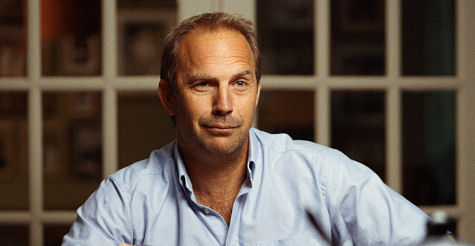
Kevin Costner in The Upside of Anger
I’m not talking about Open Range (2003), which was his first big career-turnaround film. I’m talking about how Costner seemed to become this other guy when he put on the jacket of a supporting actor in Mike Binder’s The Upside of Anger, and the way he’s done it again in Rob Reiner’s Rumor Has It (Warner Bros., 12.25).
Rumor is what it is, but at least Costner makes his scenes play pretty well on their own. The ability to make tepid dialogue sound fairly good is something to respect, I think. This is partly due to the fact that there’s no middle-aged actor around these days who seems quite as settled into himself.
I remember reading in some weekly mag puff piece about 15 years ago that Cost- ner doesn’t work out, and thinking this was kind of a funny attitude. Now I get it. Costner is Mr. Anglo-Dangle Bojangles…the laid-back guy in loose shoes who can charm without trying but just as easily let the whole thing go if the vibe’s not right.
There’s just something zen about him now, and he couldn’t have gotten to this place if he hadn’t been Mr. Big Swinging Dick with his Oscar and the failures of Waterworld, Wyatt Earp and The Postman. He had to go down and come back from that.
In a semi-fair world, Costner would be getting talked up as a Best Supporting Actor for his Anger schmanger…like he is right here and now.
Is Munich Over?
Wells note: Those damn Washington D.C.-area critics have diluted the purity of this piece by declaring that Munich is the Best Picture of 2005, but I’m running it anyway because of other supportable factors:
Eight days ago, a brand-new Time magazine cover bannered a red-letter proclama- tion that caught the eye of every film critic: Steven Spielberg’s Munich is a “secret masterpiece.”
Critic Richard Schickel’s piece about the film inside didn’t use this term (he called Munich a “very good film”), but a headline is a headline is a headline. And this one probably did more to dampen the Munich buzz than anything else.
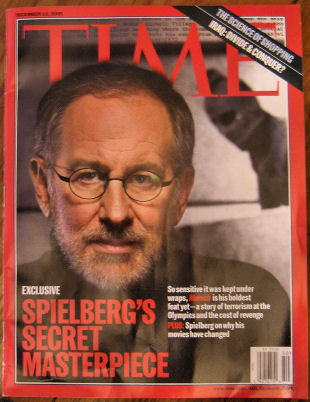
Not because Spielberg’s longish heavygoing drama about an Israeli revenge cam- paign against the plotters of the ’72 Munich massacre is a deeply flawed film (although some early-bird critics feel that way, including Variety‘s Todd McCarthy), but because most of the reactions so far have been mixed positive or mixed nega- tive…and no one I’ve read so far is using the “m” word.
Munich has its admirers. I think it’s a fairly decent procedural. Newsweek‘s David Ansen, the New York Press‘s Armond White and the Toronto Star‘s Peter Howell are fans. And like I said earlier, Washington, D.C.-area critics have named it the year’s best.
But diversity doesn’t mean plurality. Munich won’t even be seen by the Academy membership until this weekend, but there’s a growing impression in Los Angeles (from my perspective, at least) that it’s not catching on.
I don’t know if it’s imploding or just sitting there or what, but if Munich was a small private plane at Santa Monica airport the engine would be barely idling and the pilot would be off getting a coffee somewhere.
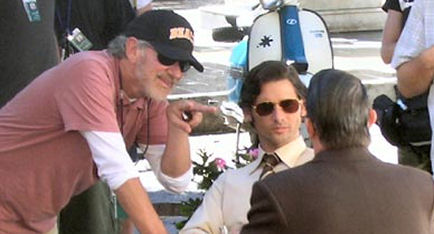
Munich may punch through as a Golden Globe nominee tomorrow morning (the HFPA Spielberg suckup factor), but it’s probably over and out as an Academy Best Picture contender.
I’m trying to recall another deeply serious, end-of-the-year, Oscar bait movie from a major-league director that has opened and, in a manner of speaking, “closed” quite so quickly.
Part of the counter-energy is that Munich may be facing an under-enthusiastic response from Jewish Academy members over concerns that its view of the Israel-Palestinian quagmire is too equivocating and fable-like.
I haven’t done any in-depth polling about this, but there was that New York Times David Halbfinger piece about the potential for Jewish/Israeli blowback. Plus that 12.11 New York Times piece by David Brooks arguing that Spielberg “has to distort reality” in his film “to fit his preconceptions.” And an older Jewish colleague who’s seen and not liked Munich at all is half-joking that local Rabbis may be advising their congregations not to see it.
There’s also the apparent fact that Munich has failed to provoke serious discussion about its being a Best Picture finalist among the New York, Los Angeles and Boston film critic groups who’ve recently mulled things over before deciding their year-end awards.

(NYFCC president Gene Seymour said there were some Munich supporters who spoke up, etc., but obviously nothing came of it.)
Munich hasn’t exactly gained upon reflection but I still feel moderately positive about portions of it. If you take away those odd third-act shortcomings — that husband-and-wife sex scene, for instance — it’s a pretty good stab at reviving the spirit (if not the political leanings) of a ’70s Costa-Gavras film.
The box-office will be the final factor, and this also looks like a stumbler. I’m getting the feeling that people are disinterested in Munich because they don’t care about the Israeli-Palestinian struggle (or are bored with it), in the same way they decided they didn’t want to see a movie about tobacco companies and the risks of smoking when they decided to blow off The Insider.
I know, I know…The Insider was about the killing of a major news story due to corporate influence upon a news-gathering organization. And Munich isn’t about an Israel payback mission in ’72 and ’73 as much as the vicious cycle of tit-for-tat revenge.
It could be argued that the most damning sign of a film’s apartness and collapsing prestige within mainstream consensus circles is its support by the notoriously independent Armond White.
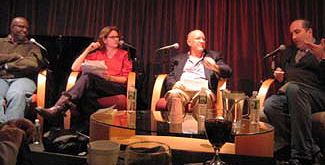
At a film critics discussion at Manhattan’s Makor yesterday, the New York Press critic said that as we’re “living in a cynical age we need movies that teach us how to remember that we’re human. To remember that we’re like others.”
Panel moderator Michael Zam quickly asked, “So what are some movies that make you feel that this year?”
“Munich,” White replied. “The great, great Munich.”
“Oh my God,” exclaimed Us critic Thelma Adams.
Grizzly Day
“Hasn’t Grizzly Man been picked as the Best Documentary by all the groups except the Boston Film Critics (Murderball) and the National Board of Review (Penguins)?
“I noticed this morning that Roger Ebert, in his pan of 39 Pounds of Love (which he gave 1.5 stars to), pointed out the fact that it’s a travesty that a film like that was put on the AMPAS list above Grizzly Man.
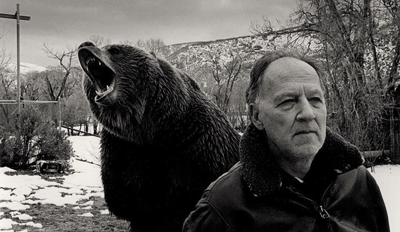
Werner Herzog
“In fact when you look at the films that didn’t make the Academy list, there are quite a few that have wider/greater critical acclaim than those on the list. I forget who told me this, but AMPAS claims that both Grizzly Man and Gunner Palace didn’t score high enough.
“I am really surprised that the hasn’t taken issue with the AMPAS voting like they did last year. If you ask me, AMPAS is the guardian of the politically correct, and that usualy means little hope for films like Grizzly Man or Tarnation (which was passed over last year).
“Film is art. Art is not a popularity contest. Popularity is often about being mundane. Political correctness is the mundane in action.” — Michael Tucker, director of Gunner Palace.
Reasons to Deny
“I’m beginning to think that the Munich backlash is about two things. The fact that nobody cares that muich and the fact that Israel is obnoxious.
“One, a great majority of Americans (besides the religious right and the Jewish lobby) just look at the 1972 Munich massacre as just another episode in a non-ending war of two peoples that most Americans don√ɬ¢√¢‚Äö¬¨√¢‚Äû¬¢t have anything against either (i.e., neither is fully right or wrong).
“I mean, come on…Israel only a few years earlier did a preemptive strike on Nasser and took East Jerusalem and the remainder of the territories, and then wondering why Arab folks and Palestinians in particular have launched a guerilla war. After that Sadat’s war in 1973 on Yom Kippur shouldn’t have surprised anyone.
“And two, the real conservatives — i.e., the ones that are not neo-conservatives or the lackeys of the Isreal lobby on the left (Lieberman, Hillary Clinton, etc.) — also look at the Munich episode as just another example of an ongoing cycle. Why should we support one over the other (in the general sense of terms) when the Cold War is over and Israeli√ɬ¢√¢‚Äö¬¨√¢‚Äû¬¢s significance to the Cold War has ended?

“Some could say the nation itself is similar to South Africa, where one group of people have stripped the rights of an entire other people (the only difference is cultural rather than race; one white group against another white group, etc.).
“Critics and film makers themselves use their own political believes in some cases to judge or make films. Maybe this is the case with this film. I really don√ɬ¢√¢‚Äö¬¨√¢‚Äû¬¢t know. If Spielberg is making it more neutral, those that are outraged at the murders by the Palestinians will hate the film even if Spielberg doesn√ɬ¢√¢‚Äö¬¨√¢‚Äû¬¢t go off on his sappy way of doing things.
“And those that support the Palestinians (and the UN’s 40-year-old demand that Israel get out of the territories and East Jerusalem and remove all illegal immigration of Israelis to the occupied territories) will in all ways be biased against any portrayal of Israeli agents and military and what they do.
“I’m referring to the supposedly present day targeted assassinations of terrorist leaders by U.S. made Apache helicopters and missiles with Israeli emblems on them that take out dozens of houses and therefore civilians won√ɬ¢√¢‚Äö¬¨√¢‚Äû¬¢t help any film about Munich for those that simply can√ɬ¢√¢‚Äö¬¨√¢‚Äû¬¢t separate film from politics.” — Philip C. Perron
Knightley
“Get over Keira! She will be Oscar nominated — deal with it. The way you trash her, you’d think she rejected you about something.
“We also get you think Rachel McAdams is the next Julia Roberts. Problem is, America disagrees. Red Eye took a nose dive, and she wasn’t exactly the reasons people saw Wedding Crashers.” — Doveplan@aol.com
Wells to Doveplan: “America” is always slow to come around. Either you get Rachel McAdams or you don’t. And Knightley won’t be nominated for anything — deal with it.
I spoke to New York
I spoke to New York Film Critics Circle president Gene Seymour a little while ago about this morning’s “shockingly convivial” balloting, and particularly the Brokeback Mounain trifecta — Best Picture, Best Director (Ang Lee) and Best Actor (Heath Ledger). Here it is…
Brokeback Mountain has been named
Brokeback Mountain has been named the Best Picture of 2005 by the New York Film Critics Circle, following the same decision announced by the Los Angeles and Boston film critics, and Ang Lee has been named Best Director. And Heath Ledger has put a stop to Phillip Seymour Hoffman’s unbroken winning streak by being named Best Actor for his inhabiting of Brokeback‘s Ennis del Mar. And isn’t it great that Werner Herzog’s Grizzly Man won yet again for Best Feature Documentary, on top of getting the same award from the L.A. and New York Online Film Critics? (The honorable Oscar Documentary committee didn’t even include Grizzly Man on its preliminary contender list.) Wong Kar Wai’s 2046 was named best Foreign-Language Film and the Best First Award went to Capote‘s director Bennett Miller. And Reese Witherspoon was named Best Actress for Walk the Line, agreeing with the Boston Film Critics vote last weekend. William Hurt won for Best Supporting Actor in A History of Violence and his costar Maria Bello won for Best Supporting Actress. The Best Cinematography award went to Christopher Doyle, Lai Yiu Fai and Kwan Pun Leung for 2046 and Noah Baumbach womn the Best Screenplay award for The Squid and the Whale.
New York Times reporter Sharon
New York Times reporter Sharon Waxman has delivered a well- reported timeline piece about how the Paramount acquisition of DreamWorks came together earlier this month, and in the process snatching the opportunity from Universal. A $1.6 billion invest- ment in the future — a purchase of the DreamWorks name, of the company’s film library and the prestige factor of having Steven Spielberg working on the Paramount lot and….what else exactly? Spielberg and his two DreamWorks partners David Geffen and Jeffrey Katzenberg will each pocket around $172 million…great. But can someone explain to me how the DreamWorks purchase is going to inject $1.6 billion worth of assurance and vitality into Paramount’s quest to supply big-screen diversion to the dream-seeking, ticket-buying public? The core value of any entertainment company is about generating magic-spark elements and X-factor alchemy, and I’m very skeptical about these middle-aged guys supposedly having a Midas-touch ability in this regard. I mean, I really don’t get it, especially considering the growing belief that Spielberg is past his prime (Munich certainly doesn’t argue against this thesis) and the fact that he’s been talking to friends about wanting to downshift out of directing down the road and putting more of his time and energy into altruistic pursuits, like improving the opportunities for education among third-world peoples. What Paramount’s Brad Grey has purchased, bottom line, is a certain notion of connected- ness (talent relations, industry relationships, a presumptive talent pipeline) and faith in dream-factory fertility.
New York Times reporter David
New York Times reporter David Halbfinger has run a story about being invited down to the flat marshy area south of Marina del Rey to see the not-quite-right, slightly fake-looking object d’art recontruction of the collapsed World Trade Center towers for Stone’s (and Stacy Sher and Michael Shamberg’s) World Trade Center, about the two buried Port Authority workers who were the last (or among the last) to be rescued from the Ground Zero rubble. Could the producers have come up with a lumpier, more on-the-nose title? An idea, a plea…call it Underground already. A little understatement tends to go a long way.
Wait a minute…someone else (Newsweek’s
Wait a minute…someone else (Newsweek‘s David Ansen) has seen Down to the Bone, that hide-and-seek movie that opened with zero fanfare in New York and Los Angeles about three weeks ago, and has come away impressed by Vera Farmiga‘s lead performance. Ansen says Farmiga is “a revelation as a working-class junkie struggling to get clean.” Yesterday (Saturday, 12.10) the Los Angeles Film Critics proclaimed Farmiga Best Actress of the Year for the same performance. This is fascinating. I was invited to three screenings by Lisa Danna of the GS Entertainment Marketing Group in early November, but I was too busy being busy.
Seconding Saturday’s L.A. Film Critics
Seconding Saturday’s L.A. Film Critics decision, the Boston Film Critics have proclaimed Brokeback Mountain as the Best Picture of 2005 and Ang Lee as Best Director. For the third time, Capote‘s Phillip Seymour Hoffman was named Best Actor by a critics group and, for the first time, Walk the Line‘s Reese Witherspoon won for Best Actress. And Cinderella Man‘s Paul Giamatti was named Best Supporting Actor, also for the first time. The Beantowners also seconded LAFCA’s handing their Best Supporting Actress award to Capote‘s Catherine Keener and their Best Screenplay award to Capote‘s Dan Futterman. And the Best Documentary award went to ThinkFilm’s Murderball…yay.
The nominations put out today
The nominations put out today by the Broadcast Film Critics Association are too easy and all-embracing. Ten nominations for Best Picture? Six nominations in each major acting category? And six Best Director noms? Why not seven in each category? Why not eight? Wait…why not nine or ten? Spread the love around! Kiss everyone’s ass! Get as many people to come to the BFCA awards as possible….wheeeeeeee!
By naming Keira Knightley as
By naming Keira Knightley as 2005’s Best Actress for her perf- ormance in Pride and Prejudice, The New York Online Film Critics have splooged all over their reputation as a serious quality- judging entity. The fact that Knightley is a lightweight attitude actress, a flirt, a woman who conveys no sense of even a stream (much less a river) running through her is incontestable and not open for discussion. The members of the NYOFC need to take a couple of days off, take a bus to the Pennsyvania countryside, check into a reasonably priced motel and get together and ask themselves how this could have happened. Otherwise, good calls all down the line. A nice pat-on-the-back attaboy for director-writer Noah Baumbach by proclaiming The Squid as the Whale as Best Picture. Capote‘s Phillip Seymour Hoffman was named Best Actor…but of course! The Constant Gardener‘s Fernan- do Meirelles was named Best Director…very cool. Casanova‘s Oliver Platt was named Best Supporting Actor…fine. Junebug‘s Amy Adams was named Best Supporting Actress, the great Terrence Howard was named Best Breakthrough Performer, Paul Haggis got the Best Debut Director and Best Screenplay award, Werner Herzog’s Grizzly Man was named Best Documen- tary (that’s two Best Doc awards for this absolutely first-rate film, which the perceptive Academy documentary committee didn’t even put on their short list), and Downfall was named Best Foreign Film.
